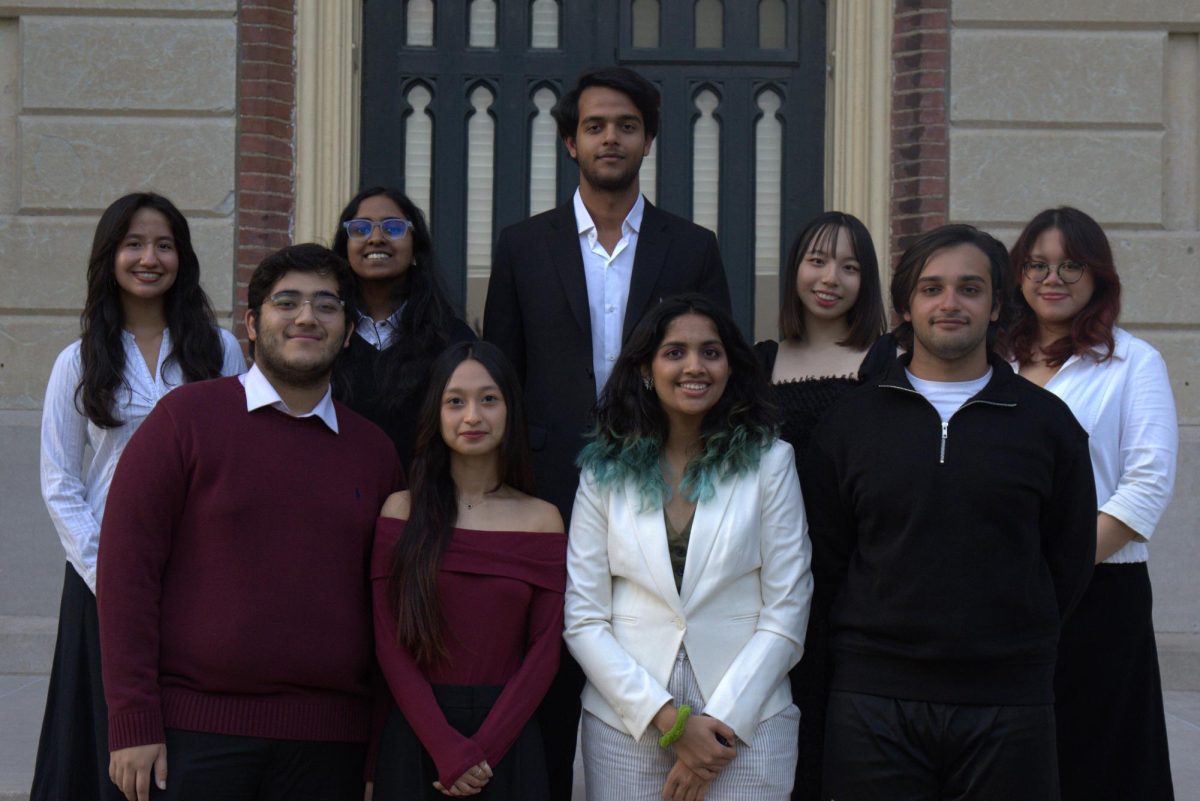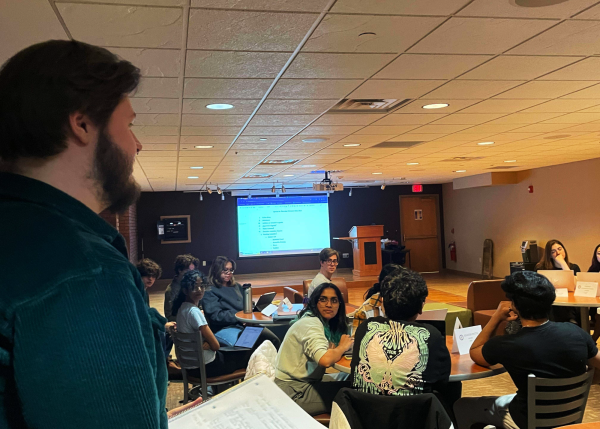
Thursday, Feb. 22, during the Student Senate general assembly, students protested in Public comment about the new Senate bylaw regarding the required attendance of club representatives in general meetings. The general unhappiness was mainly about the apparent risk of budget removal in case a club did not send a representative.
Mateen and McLean clarified that the bylaw did not have the intention to threaten students, and the denial of funds was meant only as a last resort. Following the clarification, students raised concerns about miscommunication around campus.
Sophomore Phoebe Amiri was the first to make a statement in Public Comment. Amiri’s speech urged the bylaw’s removal before implementation. She acknowledged the intentions of the policy as promoting campus connectedness, but she argued that forcing students to show up under the pressure of getting their budgets taken away would cause students to connect against the Senate.
“I, as well as many others, believe this policy is harmful and will cause a lot of issues on campus. And I’d like to ask you to remove this policy before it comes into effect, ” said Amiri. “I’ll start by saying that I think promoting campus connectedness is really good… I do think that this will promote club connections, but we will be united against you in this absurd policy. It is one thing to invite clubs to participate. It is a very different thing to force clubs to participate and hold their budget hostage if they don’t comply with your demands.”
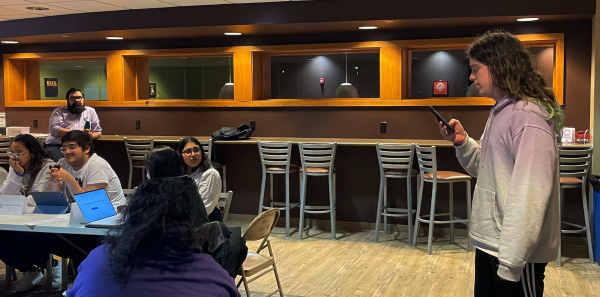
Amiri raised concerns about the policy adding a new commitment to students’ already limited time. She predicted that people would be forced to sacrifice activities like event planning, homework, and personal well-being to fulfill its requirements. Amiri argued that the law is also harmful to small clubs since they have fewer people to provide availability to attend Senate meetings.
“Because of this new policy, how many people do you think are going to show up to tutoring on Thursdays looking for help with homework just to find that the tutors are now required to sit in a senate meeting just to keep their clubs from dying?” Amiri said. “Small clubs that barely have enough execs to keep the club going are going to fold from this.”
Payment issues were also raised in Amiri’s speech. She criticized the bylaw for requiring club representatives to attend meetings without compensation while senators are paid.
“While we’re on the topic of money, I’ll remind you that all of you are getting paid as senators. These reps would not be paid. You’re forcing us to come to your meetings, doing your jobs. But you still pay yourselves, but you don’t pay us,” Amiri said.
Amiri was not the only one to share concerns about the club representatives’ compensation for attending meetings. On the same day as the assembly, two posts circulated on YikYak, a social media application that allows users to anonymously create and view posts, about a potential push toward the Senate to have the required club members to get paid as well.
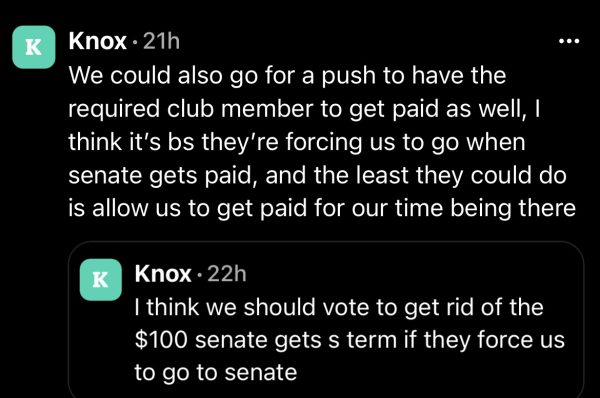
Amiri was also discontented with the lack of communication with clubs for the new bylaw. According to them, clubs were not consulted on whether the policy would be beneficial.
“You didn’t ask clubs if this would be helpful. You didn’t first try seeing if club execs had other ideas. You didn’t even think this through if this would actually work,” said Amiri.
Amiri said that in case the Senate pushes the law forward, she and others will persistently attend meetings and bring forth every issue concerning Knox College. She then concluded her speech by accusing students in power of overusing it.
“If you really want us to show up, we will show up.” Amiri said. “And you want us to be there and tell you about the issues with Knox College? We will. Every little thing. […] If you ignore every warning I’m giving you now, then I guess I’ll be here next term. And next year, and the year after. And I’m not going to hold anything back,”
Following Amiri’s statement, Assistant Dean for Campus Life Jacob McLean took responsibility for the idea behind the proposed bylaw change.
“I gotta take some of the heat off the Senate because the bylaw change was my idea,” said McLean. Later, he added, “So if there is hate and things to send, send it my way. What I recognize about this group is that there’s no malicious intent.”
However, McLean highlighted that the implementation and timeline were discussed by the General Assembly. McLean also mentioned that there were thoughts about reconsidering the timeline during a recent meeting.
McLean defended the idea behind the bylaw, suggesting that it’s a common practice in other Student Senate bodies. He emphasized the issue of low student engagement on campus and said the new policy is an attempt to minimize this problem.
“I think that this is an attempt to get people in a room to have a conversation because the people sitting around tables in this room are not enough. You are right that some of the meetings are boring, but it’s because we’re not hearing student voices,” McLean said.
Senior Ford Walters questioned why, if the objective is to increase club participation in discussions, not organize meetings dedicated to specifically club matters instead of requiring club representatives to attend General Assemblies.
“Every time we meet there’s something that could affect a club,” McLean said in response.
To support his argument, McLean referenced how once a term President Andrew McGadney attends the Student Senate General Assembly, making himself available to the students’ voice. However, rarely there are students in the room. McGadney was present last general assembly on Feb. 8, when elements regarding the participation of club representatives in General Assemblies were raised. Aside from Senators, there were few to no students present.
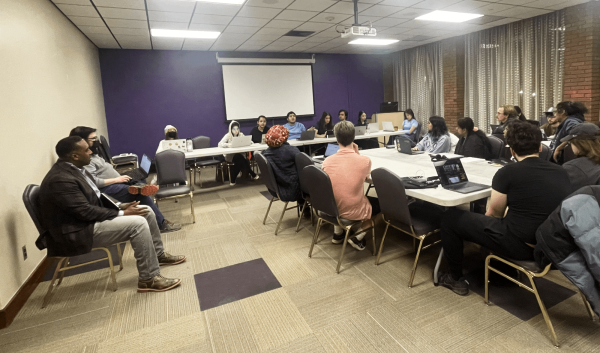
McLean acknowledged the concern regarding the policy’s connection to club budgets and the perception of it being punitive or threatening. He clarified that the intention behind the policy is not to punish, but to find ways to support clubs and organizations.
“I would prefer the word incentive because that sounds nicer than threat since it’s truly not intended as a threat. I don’t think anybody’s looking for ways to take away budget, ” said McLean, “Missing meetings does not equal your budget getting removed”.
Sophomore President Sikandar Mateen clarified that the measure mentioned in a TKS article regarding the denial of funds to a club would be applied only as a last resort. Mateen argued that removing a club’s budget in case of extreme situations is an action the Senate could take even before the new bylaw was passed.
“That particular measure is only if there’s no other way out,” said Mateen. “That is something that the Senate has the power to do so even before this bylaw was passed.”
Mateen commented that a case that could result in a club not getting a budget would be if said club did not attend a budgeting session, since they would not be able to apply for a budget.
“If you don’t go to a budgeting session, which happens at the end of spring and which is mandatory, and you apply for budgeting, you either don’t receive budgeting, or there’s a particular holdback, right? That’s how it works,” said Mateen.
In response to the accusation that clubs were not consulted in the making of the bylaw, Mateen asserted multiple clubs supported the idea.
“I have received a lot of emails from a lot of club representatives or presidents with whom we are working together,” said Mateen.
To avoid disruptions on the GA’s agenda, McLean invited students who had concerns regarding the bylaw to a conversation in the Senate’s office. In the Senate Room, a question arose about whether a club’s budget would be fully removed in case of the “worst case scenario” mentioned by Mateen.
“Is it a question of fully removing [the club’s budget]? No, ” McLean said. He mentioned Robert’s Rule of Order, which allows a motion to reconsider a previous motion. Therefore, even if a club loses its budget in extreme cases, a motion can be raised to review and discuss that decision.
Amiri said that part of her discontent with the bylaw was due to miscommunication. Initially, she perceived the Senate’s intentions as potentially malicious, but after hearing statements from Mateen and McLean, she reconsidered her stance.
Fifth-year Sage Isenhart claimed that miscommunication was spread through Discord, in the server “Clubs and FSL Life”. According to them, the rumor that no clubs were consulted in the shaping of the bylaw raised repercussions.
Isenhart further noticed the challenge of obtaining information from the Senate’s minutes because there are few to no descriptions of the topics presented.
“Unfortunately, I stopped reading [the minutes] because they’re hard to comprehend,” Isenhart said. “They had the topics of discussion, but they did not write down what they were talking about.”
It was acknowledged by students that the Senate’s intention with the bylaw was not to sound threatening, but due to a lack of communication and clarity, it was perceived that way.
Students expressed confusion about what had been said by Mateen and McLean and what was presented in the TKS article “Club Presidents Express Their Thoughts on New Student Senate Bylaw”.
The article informed that a club may lose their budget in case a club does not send a representative to the GAs, but did not specify that this measure would be only applied in extreme cases, once there was no other way out.
Even then, that decision could be reconsidered with discussion. This information was just clarified by the Student Senate during the last General Assembly.




